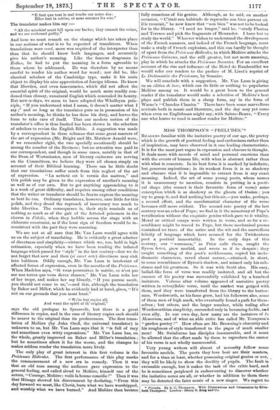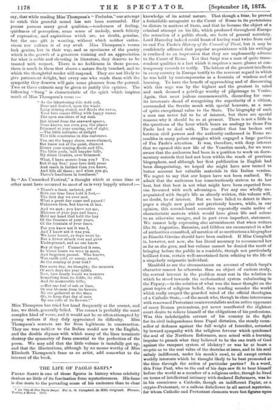MISS THOMPSON'S " PRELUDES."
READERS familiar with the imitative poetry of our age, the poetry which is the growth of poetical feeling and enthusiasm rather than of inspiration, may have observed in it one leading characteristic. It is for the most part vague in expression and obscure in thought. It deals more with moods of mind and personal emotions than with the events of human life, with what is abstract rather than with what is concrete. In its best form it is marked by indefinite, but generous aspirations ; in its weakest form it is so shadowy and obscure that it is impossible to extract from it any exact meaning. Indeed, the art of some young poets, whose names it is unnecessary to mention, consists in putting in a poeti- cal shape (the sonnet is their favourite form of verse) some conception which is as shadowy as the ghosts of Ossian ; you try to grasp it, and find nothing but thin air,—you make, perhaps, a second effort, and the unsubstantial character of the verse becomes still more evident. The second-rate poetry of the last century was an echo of Pope; we find in it the monotony of Pope's versification without the exquisite genius which gave to it vitality. Moral or critical essays were written in verse, and so far a re- semblance might be traced to Pope, but these mechanical poems contained no trace of the satire and the wit and the marvellous felicity of language which have secured for the Twickenham
poet a poetical immortality. In the early days of this century, our " versemen," as Prior calls them, caught the Byron fever, grew morbid, and wrote as if in despair ; they caught something of the poet's recklessness, copied his melo- dramatic characters, raved about nature,—attained, in short, to some resemblance of Byron's shadow, and missed only his sub- stance and his greatness. So it was with Scott also. His easy, ballad-like form of verse was readily imitated, and all but the essence of his poetry was successfully exhibited by a hundred imitators. Volume after volume appeared of narrative poetry written in octosyllabic verse, Until the market was gorged with them, and they were transferred from the library to the butter- man. Wordsworth, as his fame grew, had his followers also, some of them men of high mark, who eventually found a path for them- selves ; but others, and the larger number, while toiling after Wordsworthian simplicity, succeeded only in becoming feeble, aid even silly. In our own day, how many are the imitators of In Memoriam, and of what an able critic has called Mr. Tennyson's "garden poetry !" How often are Mr. Browning's obscurity and his roughness of style transferred to the pages of much smaller men! Mr. Swinburne has disciples innumerable, and it must be allowed that the effort made by them to reproduce the canter of his verse is not wholly unsuccessful.
Very young writers will almost of necessity follow some favourite models. The poets they love best are their masters, and for a time at least, whether possessing original genius or not, they will be likely to show the docility of pupils. The fault is excusable enough, but it makes the task of the critic hard, and he is sometimes perplexed in endeavouring to discover whether the imitative notes are all, or whether in addition to them there- may be detected the faint music of a new singer. We regret to.
• Preludes. By A. C. Thompson. With Illustrations and Ornaments by Eliza- beth Thompson, London ; Henry B. King and Co.
say, that while reading Miss Thompson's "Preludes," our attempt to catch this grateful sound has not been successful. Her poems possess many good qualities,—tenderness of feeling, quickness of perception, some sense of melody, much felicity of expression, and aspirations which are, no doubt, genuine, but the one gift is wanting, without which neither enthu- siasm nor culture is of any avail. Miss Thompson's verses lack genius, but in their way, and as specimens of the poetry which is the growth of a generous training and an appreciation for what is noble and elevating in literature, they deserve to be treated with respect. There is no feebleness in these poems, there is much in them that shows a nature finely touched, and to which the thoughtful reader will respond. They are not likely to give permanent delight, but every one who reads them with the sympathy they deserve will gain some pleasure from the perusal. Two or three extracts may be given to justify this opinion. The following "Song" is characteristic of the spirit which inspires much of Miss Thompson's verse :—
"As the inhastening tide doth roll, Dear and desired, upon the whole Long shining strand, and floods the caves. Your love comes filling with happy waves The open sea-shore of my soul. But inland from the seaward spaces, None knows, not even you, the places Brimmed at your coming, out of sight, —The little solitudes of delight This tide constrains in dim embraces.
You see the happy shore, wave-rimmed, But know not of the quiet, dimmed Rivers your coming floods and fills, The little pools, 'mid happier hills, My silent rivulets, over-brimmed.
What, I have secrets from you? Yes. But 0 my Sea! your love cloth press And reach in further than you know, And fills all these; and when you go, There's loneliness in loneliness."
In "An Unmarked Festival," a thought which at some time or other must have occurred to most of us is very happily uttered :—
" There's a feast, undated, yet Both our true lives hold it fast,— The first day we ever met.
What a great day came and passed ! Unknown then, but known at last.
And we met ; you knew not me, Mistress of your joys and fears ; Held my hand that held the key Of the treasure of your years, Of the fountain of your tears.
For you know not it was I, And I knoW not it was you. We have learnt, as days went by. But a Rower struck root and grew Underground, and no one know.
Bay of days ! Unmarked it rose, In whose hours we were to meet, And forgotten passed. Who knows, Was earth cold, or sunny, sweet, At the coming of your feet?
One mere day, we thought ; the measure Of such days the year fulfils. Now, how dearly would we treasure Something from its fields, its rills, And its memorable hills; —But one leaf of oak or lime, Or one blossom from its bowers No one gathered at the time. Oh, to keep that day of ours By one relic of its flowers!"
Miss Thompson has tried her hand frequently at the sonnet, and has, we think, generally failed. The sonnet is probably the most 'complex kind of verse, and it would not be so often attempted by young writers if they duly appreciated its difficulty. Miss Thompson's sonnets are far from legitimate in construction. They are true neither to the Italian model nor to the English, and the double rhymes with which many of the lines terminate destroy the symmetry of form essential to the perfection of the poem. We may add that the little volume is tastefully got up, and that the illustrations, although by no means worthy of Miss Elizabeth Thompson's fame as an artist, add somewhat to the interest of the book.































 Previous page
Previous page